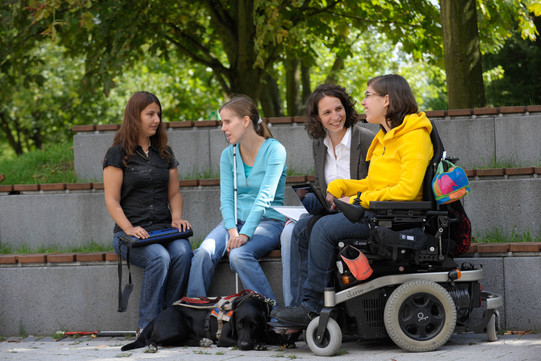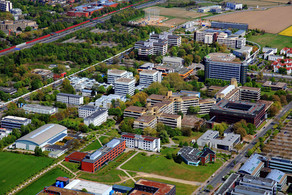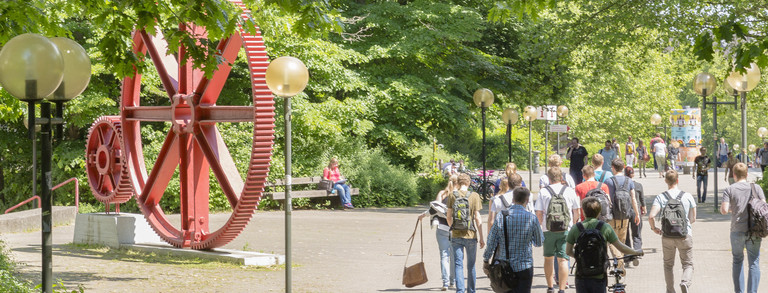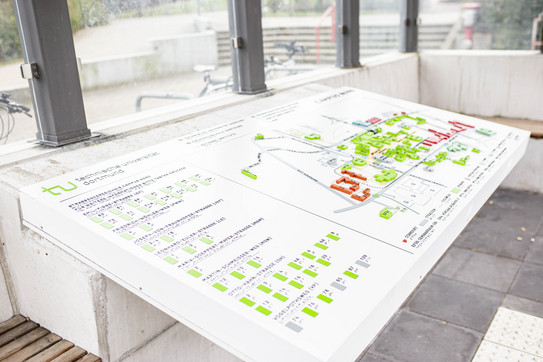Inclusion and Participation
Diversity management at TU Dortmund University defines disability policy as a cross-sectional task in all political fields, which is concretized in disability mainstreaming (in German) as derived from the UN Convention on the Rights of Persons with Disabilities (UNCRPD). The "One University for All" action plan, which has been in place since 2020 and was updated for a further four years in 2023, includes more than 20 measures. In addition, specific goals for TU Dortmund University employees have been set out in the Inclusion Agreement (in German). Various stakeholders are working closely together to ensure that equitable study and working conditions become a reality. In accordance with its Sustainability Strategy, TU Dortmund University aims to be structurally and informationally barrier-free by 2025. In particular, barrier-free access to information about research, teaching and the university's services is to be realized by then and barrier-free routing on campus is to be completed.
The 22nd Social Survey found that a total of 16% of students in Germany study with an impairment that makes studying difficult (Kroher, M. et al. 2023, p. 42). More precise data and detailed results on studying with disabilities are provided in the report published in December 2023 entitled "best3. Studieren mit einer gesundheitlichen Beeinträchtigung" (in German). In the course of its publication, TU stakeholders will be provided with additional individual data for evaluation. The DDivision of Disability and Studies" (DoBuS) assumes that the number of students with disabilities and chronic illnesses at TU Dortmund University corresponds to the national average of 16% (as of January 2024).


For over 40 years, DoBuS has been providing innovative, research-led impetus at TU Dortmund University and offers concrete assistance to create equitable study conditions for students with disabilities and chronic illnesses. Located in the Center for Higher Education (Zentrum für HochschulBildung, zhb), DoBuS advises and supports prospective students, students and employees on the topic of "Disability and Studying". Various discussion groups and the peer mentoring program are offered as part of peer support. In the area of Accessible Media and Assistive Technology, DoBuS supports students with regard to the opportunities and limitations of using assistive technology, among other things. Teachers and all other employees are supported in the creation of accessible learning environments and materials in terms of digital accessibility. Finally, as part of the so-called "Dortmund Work Approach", DoBuS derives structural and university policy measures to create accessibility based on the advice and support of individuals.
Within the General Students' Committee (Allgemeiner Studierendenausschuss, AStA) at TU Dortmund University, the Autonomous Organization for Students with Disabilities (ABeR) works independently to promote equal opportunities and accessibility.
The Representative of Severely Disabled Persons (Schwerbehindertenvertretung, SBV) (in German) represents the concerns of employees at TU Dortmund University who are severely disabled or at risk of becoming disabled by offering a comprehensive range of advisory services and also, for example, by supporting the equipping of workplaces for the disabled and accompanying job interviews.
The campus of TU Dortmund University is barrier-free and there is a guidance system for the blind (Blindenleitsystem) (in German) on many routes. An audio-tactile map (audio-taktiler Lageplan) (in German) can be used to get an overview of the campus. All buildings of TU Dortmund University can be felt on this map.





